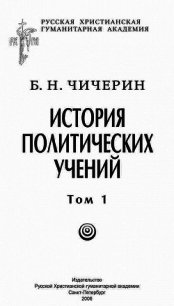Политика и рынки. Политико-экономические системы мира - Линдблом Чарльз (книги бесплатно полные версии .TXT) 📗
16
Cm.: Ralf Dahrendorf. «Class and Class Conflict in Industrial Society» (Stanford, Calif.: Stanford University Press, 1959). pp. 157-65.
17
Frank Knight. «Freedom and Reform» (New York: Harper & Brothers, 1947), p. 190; Ernest Barker. «Reflections on Government» (London: Oxford University Press, 1942), p. 40.
18
Carl L. Becker. «New Liberties for Old» (New Haven, Conn.: Yale University Press, 1941), p. 106.
19
Edmund Wilson. «To the Finland Station» (Garden City, N.Y.: Doubleday, 1940), p. 283.
20
J. L. Talmon. «The Rise of Totalitarian Democracy» (Boston: Beacon Press, 1952).
21
Также довод о том, что знание вытесняет политику, см. в: Robert Е. Lane. «The Decline of Politics and Ideology in a Knowledgeable Society» // «American Sociological Review» 31 (1966): 649-662.
22
Grossman. «The Solidary Society», p. 191.
23
Alfred North Whitehead. «Science and the Modem World» (New York: Free Press, 1967), p. 186. По свойственной модели-2 традиции обществоведы подробно исследовали полезные функции общественного конфликта. Например, см.: Lewis Coser. «The Functions of Social Conflict» (Glencoe, Ill.: Free Press, 1964), где он продолжает работу о конфликте, выполненную Джорджем Симмелем (Georg Simmel) в 1908 году.
24
См. Mary Parker Follett о поиске решений на базе интеграционных процессов в противоположность компромиссным и о роли конфликта в стимулировании поиска путей к интеграции: Н. М. Metcalf & L. Urwick, eds. «Dynamic Administration» (New York: Harper & Brothers, 1942), p. 239ff. Также см.: Coser. «The Functions of Social Conflict».
25
John Stuart Mill. «Representative Government» (London: Dent, 1910), p. 195 [Опубл. на русс. яз.: Милль, Джон Стюарт. Размышления о представительном правлении. Benson (Vt): Chalidze publ. — Перепеч. с изд. Яковлева, СПб., 1863.]
26
Такое различие проводится в: С. В. Macpherson. «Democratic Theory» (London: Oxford University Press, 1973), pp. 1-23.
27
Цит. no: Allen Kassof. «The Administered Society» // «World Politics» 16 (July 1964), p. 558.
28
Michel Oksenberg, ed. «China’s Developmental Experience» (New York: Praeger 1973), p. 29.
29
Как предполагалось некоторыми бихевиористами. Например, см.: В. F. Skinner. «Beyond Freedom and Dignity» (New York: Alfred A. Knopf, 1971). Также см.: Raymond Bauer. «The New Man in Soviet Psychology» (Cambridge, Mass.: Harvard University Press, 1952); E. L. Wheelwright and Bruce McFarlane. «The Chinese Road to Socialism» (New York: Monthly Review Press, 1970), p. 147; Richard R. Fagen. «The Transformation of Political Culture in Cuba» (Stanford, Calif.: Stanford University Press, 1969), p. 14.
30
Emile Durkheim. «The Division of Labor in Society», trans. George Simpson (New York: Free Press, 1933). [Опубл. на русс. яз.: Эмиль Дюркгейм. О разделении общественного труда. Метод социологии: Пер. с франц. А.Б. Гофмана. — М.: Наука, 1991].
31
Robert S. McNamara. «The Essence of Security» (New York: Harper & Row, 1968), pp. 109-110.
1
L. Talmon. «The Origins of Totalitarian Democracy» (New York: Praeger, 1960), C.B. Macpherson. «The Real World of Democracy» (London: Oxford University Press, 1966). Эти и другие авторы пользуются термином «демократия», в том числе по отношению и к коммунизму, и к либеральной демократии на том основании, говоря простым языком, что оба строя теоретически предназначены «для» народа.
2
О вырождении «линии масс» см. в: Victor С. Funnell. «The Metamorphosis of the Chinese Communist Party» // «Studies in Comparative Communism» 4 (April 1971).
3
Mao Tse-tung. Selected Works, vol. 4,1941-1945 (New York: International Publishers, 1956), p. 113.
4
Определение современных моделей конфликтов за власть в СССР см. в: Т. Н. Rigby. «The Extent and Limits of Authority» // «Problems of Communism» 12 (September-October 1963).
5
О Кубе см. в: James М. Malloy. «Generation of Political Support and Allocation of Costs» in «Revolutionary Change in Cuba», ed. Carmelo Mesa-Lago (Pittsburgh: University of Pittsburgh Press, 1971).
6
Конкретное исследование взаимодействия между государственными чиновниками в области образования и учеными с целью изменения политики Хрущева см. в: Philip D. Stewart. «Soviet Interest Groups and the Policy Process: The Repeal of Production Education» // «World Politics» 22 (October 1969).
7
Frederick, Barghoorn. «Politics in the U.S.S.R.», 2nd ed. (Boston: Little, Brown, 1972), pp. 198-199.
8
James R. Townsend. «Political Participation in Communist China», new ed. (Berkeley: University of California Press, 1969), pp. xiii-xiv.
9
Andrew C. Janos. «Group Politics in Communist Society» in «Authoritarian Politics in Modern Society», Samuel P. Huntington and Clement H. Moore (New York: Basic Books, 1970), p. 446ff; T. H. Rigby. «Crypto-Politics», Survey 50 (January 1964); Michel Oksenberg. «Occupational Groups in Chinese Society and the Cultural Revolution» in «Communist Systems in Comparative Perspective», eds. Lenard J. Cohen and Jane P. Shapiro (New York: Doubleday, 1974).
10
Краткое определение ряда тем в современной интерпретации плюралистических тенденций в СССР (список литературы прилагается) см.: Moshe Lewin. «Political Undercurrents in Soviet Economic Debates» (Princeton, N.J.: Princeton University Press, 1974), p. 268.
11
Jerry F. Hough. «The Soviet System» // «Problems of Communism» 2 (March-April 1972): 27-32.
12
Jerry F. Hough. «The Brezhnev Era» // «Problems of Communism» 25 (March-April 1976), p. 10.
13
A.H. Brown. «Political Change in Czechoslovakia» // «Government and Opposition» 4 (Spring 1969).
14
«New York Times», 19 September 1976, p. 1.
15
О пределах разногласий см. в: Rudolf L. Tokes, ed. «Dissent in the U.S.S.R.» (Baltimore: Johns Hopkins University Press, 1975).
16
Barry H. Richman. «Industrial Society in Communist China» (New York: Random House, 1969), p. 369ff; J. A. Cohen. «The Criminal Process in China» in «Soviet and Chinese Communism», ed. Donald W. Treadgold (Seattle: University of Washington Press, 1967); a также об СССР см. в: Telford Taylor. «Courts of Terror» (New York: Alfred A. Knopf, 1976).



